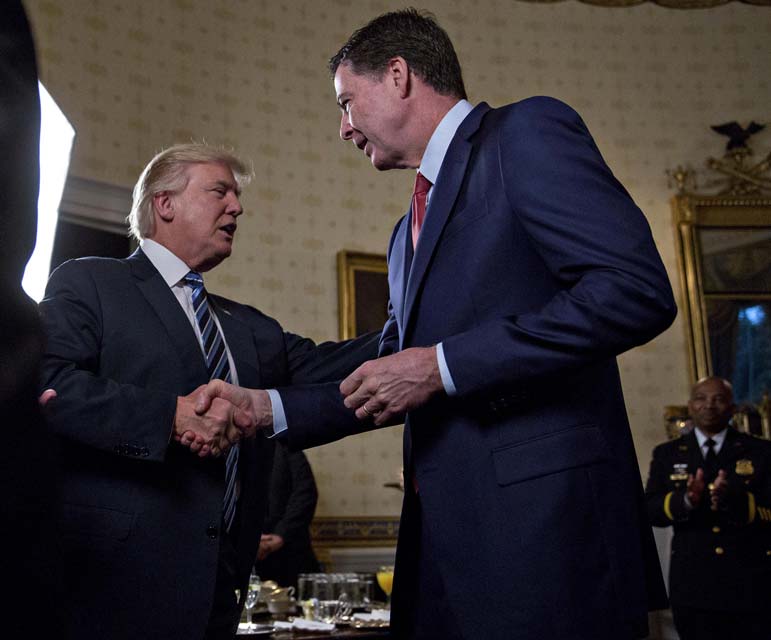 Andrew Harrer for Bloomberg
Andrew Harrer for Bloomberg
James Comey: the man who always tries to have it both ways, and sometimes succeeds.
The former FBI director's testimony before the Senate Intelligence Committee on Thursday was a feast of contradiction and self-serving showmanship.
Comey said he felt uncomfortable with the president's pressure to drop an investigation into Michael Flynn, Trump's first national security adviser. So uncomfortable that he wrote memos after conversations with the president, to record what was said by whom. But Comey kept all of this information closely held until he was fired and never tried to challenge the president directly in these conversations. So just how uncomfortable was he?
Comey told senators Thursday that Trump defamed him. In his opening oral statement, he said Trump's contentions that there was a morale problem at the bureau under Comey were "lies, plain and simple." And yet later on, Comey said he took Trump at his word when the president told NBC News that he was fired because of the Russia investigation. Why believe the president when you know him to be a liar?
None of this gets Trump off the hook. Comey's testimony portrays a president who governs like Tony Soprano -- with implied threats and bravado. These anecdotes suggest Trump has no appreciation for the independence of federal law enforcement and the dangers of politicizing the FBI.
But Comey also has some explaining to do. Here we have a former FBI director who presents himself as the last honest man in Washington. He makes a point of elaborately explaining his actions as by-the-book law enforcement. And yet his own story is a kind of paradox. He says that he felt pressured but that he did not give in to the pressure. He blows the whistle now, but didn't at the time.
Comey said he considered Trump's request to drop the Flynn investigation, a day after Flynn was fired, to be a "directive." That's not quite an order, but it's close. Yet Comey ignored that directive. He paid close attention in his meeting with Trump. He took notes and shared them with the FBI's senior leaders, but he made sure to shield his own workforce from this information, fearing it would have a "chilling effect" on the investigators digging into Flynn.
Very well. This, however, raises an important question. If Comey believed knowledge of the president's wishes to drop the Flynn investigation would pressure investigators, why leak it to the New York Times? Now every FBI agent in the country knows what Comey had hoped they would never learn.
It turns out that Comey's calculation on the Flynn request changed after he was fired. In a rare moment of Washington candor, the former FBI director acknowledged his own leak. "My judgment was I needed to get that out in the public square, so I asked a friend of mine to share the content of the memo with a reporter," he said. "Didn't do it myself for a variety of reasons, but I asked him to because I thought that might prompt the appointment of a special counsel."
Well, what do you know? Comey's leak worked. Soon after the story hit the Times, the deputy attorney general, Rod Rosenstein, appointed another former FBI director, Robert Mueller, as special counsel.
So why didn't Comey act sooner? If it was a good idea after he was fired, wasn't it also good idea before he was fired? He didn't really say. At one point, he said he believed the most important thing he could do would be to stay in his position to make sure the FBI wasn't tainted by the president's pressure. (How convenient.) At the same time, Comey acknowledged that Trump said he should investigate whether any of his associates (Trump called them satellites) did anything illegal or improper.
In his many memorialized meetings, Comey never really challenged Trump directly on these requests. The closest he came was to ask the deputy attorney general to never allow him to be in a one-on-one meeting again with Trump. When Trump asked him to drop the Flynn investigation, Comey demurred and simply agreed Flynn was a "good guy." In the hearing he said he hoped his non-answer on dropping the investigation would be a signal to the president that he couldn't do this. When Trump asked for his loyalty, he promised him his honesty, and then ultimately his "honest loyalty."
It turns out that Comey didn't deliver Trump his loyalty or his honesty. If he had, he would have told the president at the time that what he was being asked to do was wrong and that he would not work under such conditions. Instead, Comey took notes and waited for Trump to strike first.
Comment by clicking here.
Eli Lake is a Bloomberg View columnist who writes about politics and foreign affairs. He was previously the senior national security correspondent for the Daily Beast. Lake also covered national security and intelligence for the Washington Times, the New York Sun and UPI, and was a contributing editor at the New Republic.


 Contact The Editor
Contact The Editor
 Articles By This Author
Articles By This Author